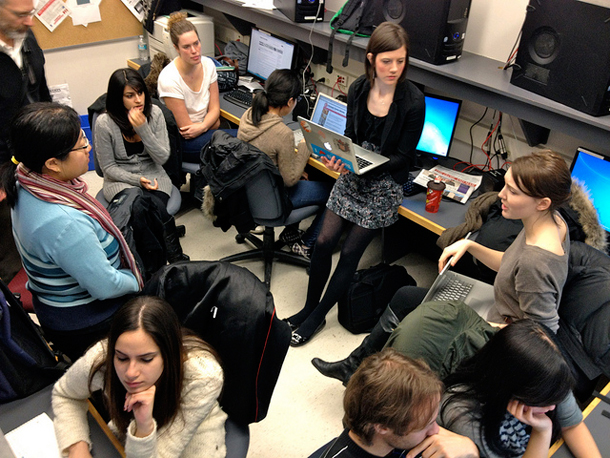Can books built for iPads be used for rich media journalism?
That's the question my Online Journalism students in the MAJ program at the University of Western Ontario are tackling.
And, we're working the Rabble and The Tyee Solutions Society to get a made-in-Canada answer.
Starting a couple of weeks ago, two student teams in the class partnered with Rabble and The Tyee Solutions Society to take a sizeable chunk of their content and convert it into a book on the iPad using Apple's new iBooks Author software.
For Rabble we're producing a rich media iBook of their Best of Rabble content for 2011. That content includes stories, videos, discussion threads, podcasts, photos and links.
For The Tyee Solutions Society, we're tackling how to convert into iBook form the COPA award-winning series it produced, "Growing the Local Bounty." That series was published in its entirety on The Tyee and parts were also published by other journalism outlets.
Put down that shovel
In both cases the students will be augmenting the provided content with additional graphics, maps, animations and audio/video interviews.
Their intent is not to just shovel the content from the Web into the iBooks. They're rethinking the content from the ground up for the new platform. They're asking good questions like:
How do we curate this experience?
How is this different from the content online? How is the user experience different?
What is the practical, appropriate way to experience audio in an iBook?
What form should the intro video that accompanies each iBook take?
How do we intro/bio authors in a rich media iBook?
When do we link to external content, and when do we keep rich media content inside the iBook?
How many gigabytes should an iBook be?
When do rich media sidebars add to a narrative and when do they distract?
What are iBooks really good at?
How can we make the production process scalable?
What does iBook-specific microcontent look like?
How do we keep the experience on-brand?
...and many more.
Watch the creative process
You can watch the students wrestle with these questions on a documentary blog other students in the class have set up to capture the process. We think that process is as important as the product and want to share it.
It's becoming increasingly clear that tablets are going to be an important part of the future of journalism. But they demand a different kind of journalism and a different set of skills, workflows, and storytelling. My students are blown away by the potential of being able to combine and embed interactive graphics, video, audio and slideshows in a single format that users can touch, flick and become immersed in. And they're discovering new choices need to be made at every turn.
It all reminds me of the early days of developing CD-ROM titles for Southam InfoLab (1991-2). We wrestled with these same issues and had the same giddy excitement as we tried to discover the optimal compression rates for video, learned how much content we could pack on a shiny disk and re-imagined storytelling.
I love watching my students learn, and am learning from them each week. The big takeaway for me so far? It's amazing how much you can rethink journalism when you let a new platform set your mind ablaze. Hope you'll watch and share their adventure. ![]()
Read more: Media















Tyee Commenting Guidelines
Comments that violate guidelines risk being deleted, and violations may result in a temporary or permanent user ban. Maintain the spirit of good conversation to stay in the discussion.
*Please note The Tyee is not a forum for spreading misinformation about COVID-19, denying its existence or minimizing its risk to public health.
Do:
Do not: